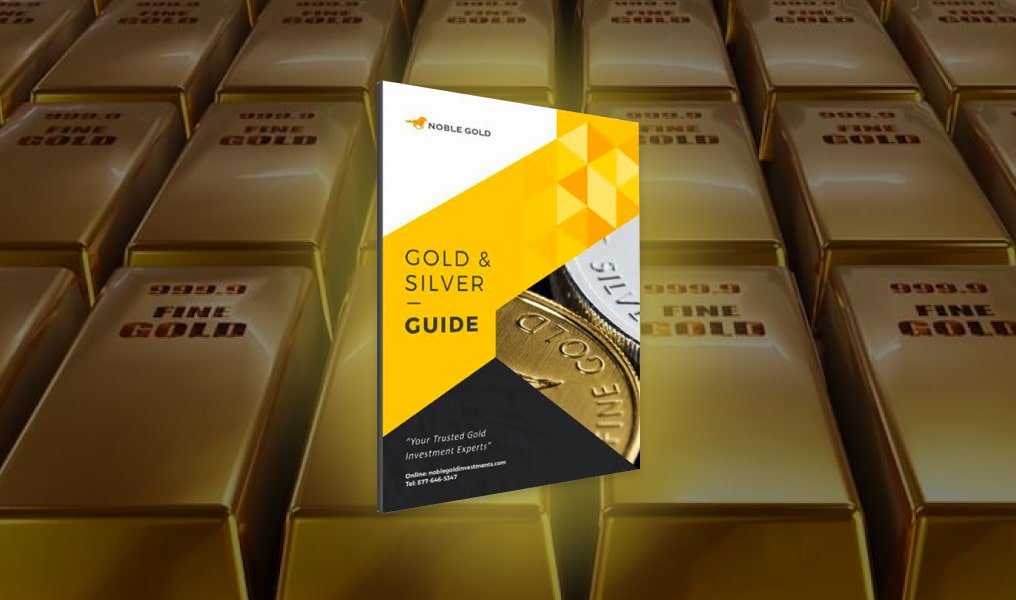You’ve worked hard to save money throughout your life and want to invest it wisely. Gold has been a highly sought-after investment option for decades. However, the type of gold you invest in can impact your risks, returns, fees, storage options, and more.
Understanding the distinctions between physical gold and paper gold can help you make an informed decision about your savings.
At Noble Gold Investments, we aim to help you secure your financial future by investing in precious metals like gold and silver. Continue reading to learn more about how physical gold differs from paper gold as an investment option.
What Is Paper Gold?
When most people think of gold, they imagine traditional gold bars or gold coins. Paper gold is an investment asset that represents a certain amount of gold. Exchange-traded funds (ETFs) are a common example of a gold-backed investment that rises and falls with the price of gold.
The idea of paper gold dates back to 1870, when the United States and other nations adopted the gold standard policy. The monetary system aligned paper money with the fixed quantity of gold. The United States ultimately terminated the gold standard in 1971 to curb inflation.
Types of Paper Gold Investments
There are a few options when investing in paper gold. A gold-backed investment opportunity must be selected since paper gold isn’t a tangible asset.
Gold ETFs
Gold ETFs are commodity funds that allow you to own gold without managing the physical asset. Essentially, the investment works similarly to stocks, allowing you to purchase, trade, or sell shares that match the current value of gold.
Investors select gold ETFs to track gold value fluctuations, understand price trends, and learn more about the precious metals industry without storing and securing the physical item.
Gold Mining Stocks
Gold mining stocks are stock market investments in gold mining companies. Investing in a mining stock includes more value fluctuation and risk factors related to the company’s debt, foreign location, infrastructure, and age.
Major mining stocks refer to strong, established organizations with reliable performance history. Junior mining stocks are typically newer start-ups with riskier track records that fluctuate more frequently due to the company’s lack of experience.
Note that mining stock investments follow market trends instead of actual gold values.
Gold Certificates
Gold certificates are tickets you can purchase and redeem for physical gold. Unfortunately, more gold certificates exist than actual gold, so the tickets bought, sold, and traded may not have registered inventories. The theory behind gold certificates is sound, though it does come with complications and risks.
During the height of the gold standard, the United States used gold certificates as a convenient form of money. Today, they’re sold as collector’s items.
Advantages of Investing in Paper Gold
Paper gold investments have many advantages, depending on your financial goals. We recommend considering the pros and cons of physical gold versus paper gold before making any decisions.
No Insurance Necessary
Physical gold requires insurance, like other tangible assets such as cars, properties, and jewelry. Insurance is necessary to protect gold from theft and transportation damage.
Paper gold doesn’t require insurance because it only represents ownership. ETF theft would require highly complex fraud and theft is impossible.
Paper Gold Is More Liquid
Liquidity refers to how readily available an asset is. Purchasing physical gold requires seller research, shipping fees, delivery complications, and more.
Paper gold, like ETFs, is easy to acquire. With access to a bank or the market, you can easily purchase and trade ETFs without excessive wait periods or complications.
Affordability
Purchasing physical gold requires a significant upfront investment. Aside from the initial cost, insurance, storage, delivery fees, and more need to be paid upfront. Often, the smallest quantities you can purchase are coins.
Paper gold allows you to invest in precious metals in smaller and cheaper quantities. There are no shipping and storage costs, so you only pay for the actual asset. Note that you may have to pay trading fees.
Flexibility
When you purchase gold bullion, you often stay locked into the investment. After you’ve paid for shipping and storage, you won’t want to repeat the process just to trade for another precious metal or gold type.
With gold ETFs and other paper money options, you can easily buy, sell, and trade at any point without high costs or scheduling conflicts. Paper gold offers better flexibility than physical gold, especially if you don’t have a specific long-term plan.
Disadvantages of Investing in Paper Gold
While paper gold may have a few advantages, it also has disadvantages. Paper gold generally offers more convenience but increased risks. Depending on your financial goals, you may want a more stable option.
Stock Market Effects
When you invest in physical gold, your finances depend on the actual asset’s value. Paper gold’s value depends on many other factors, including stock market health. In economic downturns, when the stock market drops, you may suffer value losses, even though physical gold may maintain its status.
While the stock market frequently fluctuates, you shouldn’t encounter many issues if you plan to invest long-term. Investors who want quick wins within a year or two may suffer losses from economic downturns, though if you hold your investment for decades, you can often avoid this.
Expense Ratio and Associated Fees
When considering physical gold versus paper gold, you must factor in the added fees. The expense ratio is an annual fee you must pay your ETF funds for management costs. You may also have to pay commission fees when selling or buying ETFs.
If you plan to purchase and carry your investment for decades, you can avoid excessive trading fees, though you’ll still have to pay the expense ratio each year. Consider these added expenses when weighing your investment choices.
Higher Risks
Paper gold represents gold, which means you must rely on intermediaries rather than carrying and storing the physical asset. For example, if you invest in a mining company, your funds depend on the business’s success, not the value of gold itself. Such indirect investments increase risks because they include additional factors that could affect your outcome, like companies filing for bankruptcy.
Non-Tangible Nature
You can’t take possession of paper gold like you can with physical gold. If the market crashes or your investment fails, your only option is to settle for cash, which may not be as valuable as your initial investment. Regardless of market factors, you can maintain your physical gold asset as its value matures.
What Is Physical Gold?
Physical gold refers to the traditional precious metal that is shaped into bars, coins, jewelry, and other forms. People first discovered gold in rivers and streams across the world, appearing as shiny, golden nuggets.
In 4000 B.C., ancient cultures in today’s Southeastern Europe used it for decorative objects and fashion. Historians estimate that people first mined for gold at this time in either Thrace (modern-day Greece, Turkey, and Bulgaria) or the Transylvanian alps.
Types of Physical Gold Investments
Investing in physical gold rather than paper gold means purchasing and storing the asset. Each type of physical gold comes with its own purchase prices, pros, cons, and investment returns.
Understanding the differences between the various physical gold options will help you make a better decision.
Gold Bullion
Gold bullion is the purest and most basic version of the physical asset. Unlike jewelry and coins, which offer other usages, the sole purpose of bullion is to carry the value of gold as an investment. Usually, bullion comes in 99%, 99.5%, or 99.99% purities.
You can purchase bullion as ingots, nuggets, or gold bars depending on your desired weight quantity. Each item will come printed with the manufacturer’s name, gold content, fineness, and weight. The investment offers low additional expenditures and high liquidity when converting to cash, making it a safe choice.
Gold Jewelry
Gold has remained the most timeless and popular metal choice for jewelry. You can purchase nearly any jewelry in gold, though you will pay increased acquisition costs due to the styling efforts. Most gold jewelry is not pure but is an alloy (mixed with another metal to harden the material).
Gold jewelry cannot be sold for the same price it was purchased at. Like other used items, it loses value after it enters your possession. It may remain fairly valuable, though gold jewelry isn’t the best investment choice for those wishing to capitalize on their returns.
Gold Coins
Like jewelry, gold coins are typically an alloy. Gold on its own would be too soft in coin form, leaving gold coins to be approximately 91% pure gold. You can purchase a variety of gold coins from different predominant countries, like:
- U.S. Gold Buffaloes or Gold Eagles
- South African Krugerrands
- Canadian Gold Maple Leaf Coins
Collectors often purchase gold coins to add to their collection, while investors use the coins as an opportunity to invest in smaller quantities.
Vaulted Gold
Vaulted gold is bullion that is stored in a professional bank vaulting facility. You still own the bullion, and the carrier has zero ownership over your investment. Annual fees must be paid to keep items secure in the vault, though this price is worth the security for larger investments.
Usually, you won’t ever touch your physical vaulted gold asset. You can only control any actions you wish to take with the gold, like buying more, selling, or trading. Vaulted gold offers all the benefits of bullion, with better security and reduced transportation costs.
Advantages of Investing in Physical Gold
Just like paper gold, physical gold comes with advantages and disadvantages. We recommend weighing all of these considerations before deciding how you want to invest. Continue reading to learn about the pros of investing in physical gold.
Reliability
Reliability is enormous when considering any investment opportunity, including physical gold and paper gold. Physical gold offers better reliability than paper because it doesn’t directly relate to the government or large organizations. You can rely on physical gold’s steady appreciation rates better when you don’t have to worry about the actions or fluctuations of other parties.
Physical gold also stays safe from hacking events or cyber-attacks. Many paper gold assets only offer digital trails, which are less reliable than physical assets.
Tangibility
Because physical gold is a tangible asset, there’s a finite and limited amount of it. The precious metal’s complex mining process increases its rarity and ensures that the product will remain valuable for the foreseeable future.
Paper gold’s worth relies on many other factors, while physical gold directly relates to quantity. The more scarce gold becomes, the more physical gold investments gain value.
Globally Accepted
Global cultures have used gold for centuries for trading purposes. Physical gold is a universally accepted asset that all nations recognize as valuable. Paper gold investments only offer rewards in certain places, while physical gold is beneficial regardless of where you go.
While other universal investments often have stability issues between global government policies and political events, gold remains stable because of its tangible and reliable features.
Gold Has Zero Counterparty Risk
When you purchase paper gold, you’re relying on other organizations. For example, when you buy gold certificates, you trust that the seller has the associated physical gold to go along with the purchase. Digital scammers exist, and when counterparties are involved, your risks of unfulfilled obligations increases.
The organizations that orchestrate paper money deals may not intentionally steal your money, but if they fail, so does your investment. There are no counterparty risks when it comes to physical gold. You are the sole owner of your investment and directly control everything that happens with your funds.
Gold Is A Great Hedge Against Inflation
Inflation refers to the concept of money losing value over time. When inflation occurs, the money you earn becomes less valuable because the price of goods increases. The United States and all other nations experience inflation at different economic times.
Gold maintains and increases its value during inflation, unlike cash (fiat money). Imagine that you earned $50,000 in cash pay the year you were 25, which was enough to cover rent, food, bills, and $10,000 in savings. When you retire decades later, those savings may not last you more than a few months because of the increased cost of living.
However, if you invested that $10,000 in gold, its value would increase, just as the cost of living does. When you pull those savings out to retire, you’ll have an equivalent or increased value to what you initially put in. You work hard to earn money throughout your life, and physical gold helps prevent your savings from going to waste.
Disadvantages of Investing in Physical Gold
While physical gold’s security and reliability may offer appealing advantages as you begin your precious metals investments, it isn’t without disadvantages. Physical gold isn’t as convenient as its digital counterpart, which can cause issues, especially when dealing with large and heavy quantities.
Storage
While the tangibility of gold reduces some risks, it also creates some. When you own physical gold, it must be properly stored, secured, and managed to keep it safe. Storing large quantities of physical gold at home can pose challenges because of the need for a large enough safe or vault.
You may not have as much trouble buying an at-home safe if you only own a few coins. On the other hand, purchasing bullion in bulk will likely require a vaulting service. You don’t want to risk losing hundreds of thousands or more from theft or property damage.
Insurance
Because gold is a physical asset, you also must insure it in case of an accident. You can purchase insurance for your investment through dealers or the vaulting company where you store your assets.
Insurance protects your purchase, though you must pay additional fees for this security. Some investors may find the need for insurance a nuisance after having to buy the gold itself. This extra cost may be a turnoff for those weighing their gold investment options.
Hidden Upfront and Backend Fees
Many investments involve excessive fees, and gold is no exception to this rule. Often, dealers charge percentages upon sales, and some vaults may charge a withdrawal fee. We recommend reading the fine print to understand all associated costs before investing funds.
It’s important to remember that gold isn’t immune to taxes. Like other investments, associated purchase taxes must be paid, which can add up quite a bit when spending large quantities. With gold IRAs, you can reduce tax requirements since you can’t access the funds until you retire.
Buying Physical Gold At Noble Gold Investments
At Noble Gold Investments, we’re experts when it comes to gold and other precious metals. We believe that physical gold is one of the best investments you can make considering it offers reduced risks, reliable appreciation rates, and improved security when weighing physical gold versus paper gold investments.
If you’re interested in investing in physical gold coins, gold bars, or even buying precious metals in a gold or silver IRA we can help you select and purchase the products that make the most sense for your portfolio.
Feel free to give us a call at (877) 646-5347 to speak to one of our experts. We’re ready to help you open an online account with Noble Gold Investments today and begin saving for the rest of your life.







